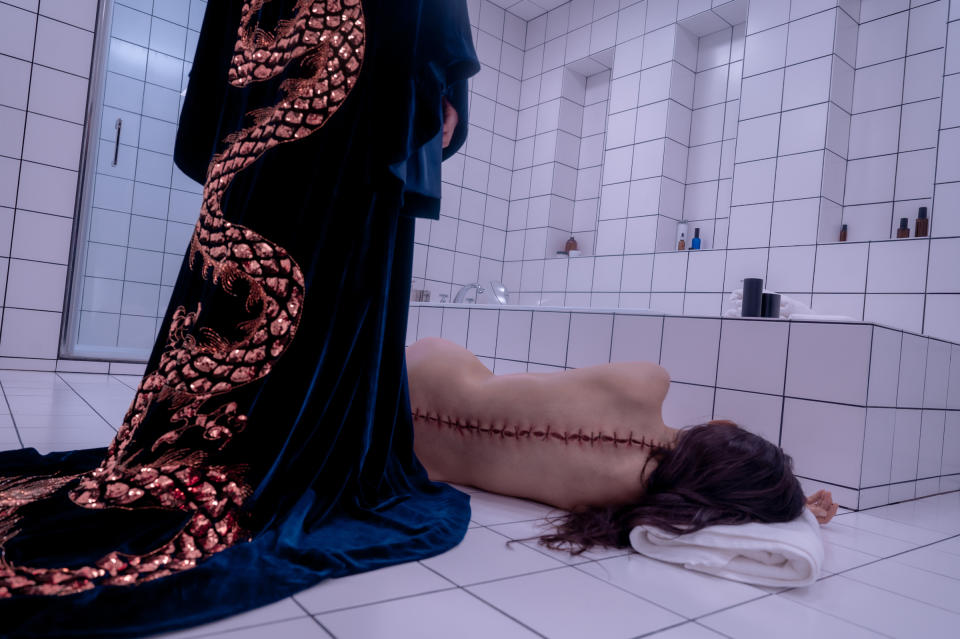It's Time for the Oscars to Take Horror Seriously

Credit - Grant, Smith: A24 (2); Moore: Universal Studios; Depp: Focus Features; Scott: Paramount Pictures
When Demi Moore won the Golden Globe for her turn as aging star Elisabeth Sparkle in French director Coralie Fargeat's body-horror hit The Substance on Jan. 5, she shared in her acceptance speech that it was the first real award she’d received in her more than 45 years in Hollywood. The moment was a bright spot of the night, with Moore touching on how the movie helped break her out of a particularly disheartening professional slump.
"I was at kind of a low point" when the unconventional script came across her desk, she recalled. "And the universe told me that you're not done."
But while recognition of the 62-year-old actor was long overdue, it was perhaps a surprise that it came for a role that involved donning grotesque prosthetics and graphically birthing a younger version of herself, considering horror’s grim awards-season track record.

In the nearly 100 years since the Oscars debuted, a grand total of seven horror movies (now including The Substance) have been nominated for Best Picture. Only 1991's The Silence of the Lambs—which is also a detective story—has won. Fargeat also earned a nod for Best Director, making her this year’s sole female nominee in the category and giving her a chance to become the second director to ever win for a horror film (behind only Silence of the Lambs' Jonathan Demme). A statuette for Moore, who received her first ever nomination on Jan. 23, would make her just the seventh actor to receive an Oscar for their role in a horror movie. It’s an egregiously low success rate for a genre that’s delivered some of film’s most memorable performances.
And Moore is just the chosen representative of a year that produced many stellar turns in a wide range of scary movies. There was Hugh Grant as a fiendishly charming religious zealot in Heretic, Naomi Scott as a pop star fighting both literal and figurative demons in Smile 2, and Justice Smith as a shy teen who develops an obsession with a cult horror series in I Saw the TV Glow. Christmas-day release Nosferatu, Robert Eggers’ remake of F. W. Murnau’s 1922 silent vampire classic, swiftly climbed into the top 50 highest-grossing horror movies of all time as critics heaped praise on star Lily-Rose Depp. Though Grant was nominated for a Golden Globe, the others have been overlooked, save for largely genre-specific or indie-focused accolades.

Gory and gruesome, The Substance was never a shoo-in for mainstream success. But a buzzy Cannes debut, a message about aging women that resonated widely, and a box-office haul of $76 million on a $17.5 million budget are all testament to how powerful a vehicle horror can be for talented actors. Still, even if Moore ends up on the podium on March 2, it doesn’t change the fact that, historically, the Academy has made a habit of snubbing some of the most deserving performances. To name just a few from the past decade: Toni Collette in Hereditary, Lupita Nyong'o in Us, Florence Pugh in Midsommar, Mia Goth in Pearl.
“At the end of the day, I think the value of award shows is to show innovation in cinema," Nyong'o said of the apparent bias against horror in a 2020 interview with BuzzFeed. "So having a discrimination against a genre feels so silly really."
Critically-acclaimed horror movies like Psycho, The Exorcist, Jaws, Carrie, and The Sixth Sense used to be able to break through and at least nab some of the big-five Oscar nominations. Past acting wins in the genre have gone to Kathy Bates for 1990’s Misery, Ruth Gordon for 1968’s Rosemary's Baby, and Fredric March for 1931’s Dr. Jekyll and Mr. Hyde, as well as Jodie Foster and Anthony Hopkins' victories for Silence of the Lambs. But after that you’d have to jump 20 years to Natalie Portman, who prima ballerina-ed her way to the most recent horror acting Oscar in 2010’s Black Swan.
In the 15 years since, Get Out's Daniel Kaluuya has been the only horror actor to even receive a nomination. And are the films becoming contenders even horror horror at all? Oscar honors seem to be reserved for movies that are considered to have transcended the genre (in itself a fairly subjective category) in some way. As The Exorcist director William Friedkin put it in 2015, "I thought it was a film about the mystery of faith...I didn’t set out to make a horror film."

More recently, even as movies like 2014’s The Babadook and Eggers’ 2016 breakout The Witch began to give rise to the controversial term “elevated horror”—a subjective descriptor for a horror movie that has supposedly achieved a higher level of artistic merit than the genre’s more mainstream fare—the chances of awards recognition seem to have dropped.
Despite its undeniable cultural impact, position as the fastest growing genre at the box office, and heightened critical attention, horror clearly continues to be viewed by many Academy voters as less-than or low-brow, at least as compared to the period dramas and biopics that frequently earn awards glory. If the Academy doesn’t reward those like Moore who are willing to take the horror leap of faith, it tacitly disincentivizes what she described in her Globes speech as “magical, bold, courageous, out-of-the-box, absolutely bonkers” performances from some of the best names in the biz. Scary thought, isn’t it?
Write to Megan McCluskey at megan.mccluskey@time.com.

 Yahoo Lifestyle
Yahoo Lifestyle 
